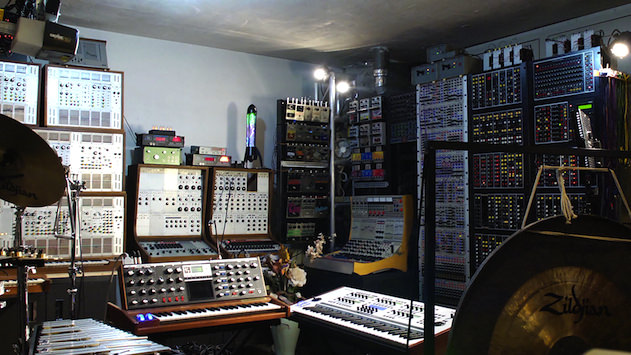
Buyer beware
Dominic Butler understands the challenge of staying focussed when using modular equipment better than most thanks to his live performances with Factory Floor. His use of modular gear in a real-world situation, interacting with the other members of the band, has taught him the best approach to getting the most from it. “I think if people have a tendency to noodle they will noodle,” he explains. “Whether that’s with a modular or a guitar and a stack of pedals. Don’t blame the tools! With Factory Floor, the modular is always underpinned with a strong arpeggio and rhythm. I’m loving the Tiptop Audio 808 and 909 modules driven by the 4ms and Rebel Tech stuff then processed with an Optomix and an Echophon. Unlimited fun! Even when the sets drift off into hectic chaotic territories they always seem to get pulled back into something comprehensible. It’s always good to go with instinct in a live situation and leave the indulgent side at home.”
Similar warnings are reiterated by almost all of the artists who contributed to this feature. The near-unanimous consensus is that modular synthesis isn’t for everyone, and that anyone with an interest in dipping a toe into the waters of modular gear should think long and hard before taking the plunge. James Holden is the most forthright: “I’d have a careful think about whether it’s for you. Modulars suit whacked-out music. If you want it for fat dubstep bass I’d honestly just stick to NI plugins. I had a friend of a friend email me: ‘So I’ve got this oscillator and this filter but I can’t make a noise. What am I meant to do?’ The answer? ‘Sell it on eBay, mate…'”
Jeremy Greenspan explains why fixed-architecture synths still retain so much appeal despite the versatility of modulars: “They work. The best of them – the ‘big boy synths’ like the ARP Odyssey, Minimoog and Jupiter-8 – are very flexible, but you can rely on them to function in a specific way. And if you’re after a sound that you know how to get, or if you’re working on a track where you want to get something happening quick, or be able to save, then you’re going to want to use a fixed-architecture synth.”
The lone voice of dissent comes from techno stalwart Kirk Degiorgio, who espoused the benefits of modular synths at length when we interviewed him last month. Degiorgio insists that a modular setup is the absolute best way to learn about analogue synthesis, and encourages anyone and everyone to give it a go. “I think it’s a golden age for analogue synths right now,” he tells us. “And most of it’s in the modular world. I think once anyone’s used a small modular system with the basic building blocks, you can give them any analogue synth, no matter how complex the routing, and they’ll find their way around it really quickly. I get asked a lot by up-and-coming artists what keyboard they should get. Don’t. Just buy a modular system. Once you learn it you’ll be able to use any analogue synthesiser out there.”

Where next?
So, if modular synths are back for good, that leaves only one question: where do they go from here? With so many manufacturers competing to invent innovative new products, the signs are good for future development of all modular synth formats.
Modcan’s Bruce Duncan believes that the modular market is stronger than ever, but warns that progression is necessary to avoid stagnation: “I see a lot of cool innovation coming from the new crop of builders and while I think a lot of them are simply polishing old concepts a lot of them are also doing new things that I never would have thought of myself. I still see some room for new ideas but it’s getting harder to be completely original with such a populated field. My hope is that buyer fatigue doesn’t set in because I think the market could become saturated with all the product that’s now available. Hopefully not for a while yet, though.”
My hope is that buyer fatigue doesn’t set in. I think the market could become saturated with all the product that’s now available.
For hexinverter.net’s Stacy Gaudreau, predicting the future of the modular synth scene is virtually impossible: “Module technologies are evolving constantly and at an alarming rate – it seems designers are inventing new ways to create sounds all the time. I feel like predicting what will happen is almost impossible since it’s such a limitless platform for new creative inventions. I’m very interested to see what new technologies in the electronics world will add to modulars – things like carbon nanotubes and atomic computing could mean very different creative tools for musicians and I’m anxious to see where these technological advancements carry us.
“I feel like modulars are already the ultimate sound design machine. The fact that they’re now becoming so popular is awesome. I hope it stays around for a long time.”
James Holden, Jeremy Greenspan, Dominic Butler, Bruce Duncan, Stacy Gaudreau and Danjel van Tijn all appear in I Dream Of Wires. The Hardcore Edition Blu-Ray/2-DVD of the film is available to pre-order until April 30th, priced from $35.

03.44 AM
Hell yes! Great article. Can’t wait for the doc.
08.40 PM
I am in the process of falling into the abyss. I fear it will be a magnificent obsession for me.
06.47 AM
Funny watched this movie on Netflix over a buddies house and seen myself in it, even one of the guys had same look as me. I can relate with fighting with the outside world to return to my modular cave. Haha
In fact it was all rocket science to my buddy, although to me everything these geeks and modular synth scientist said made sense.